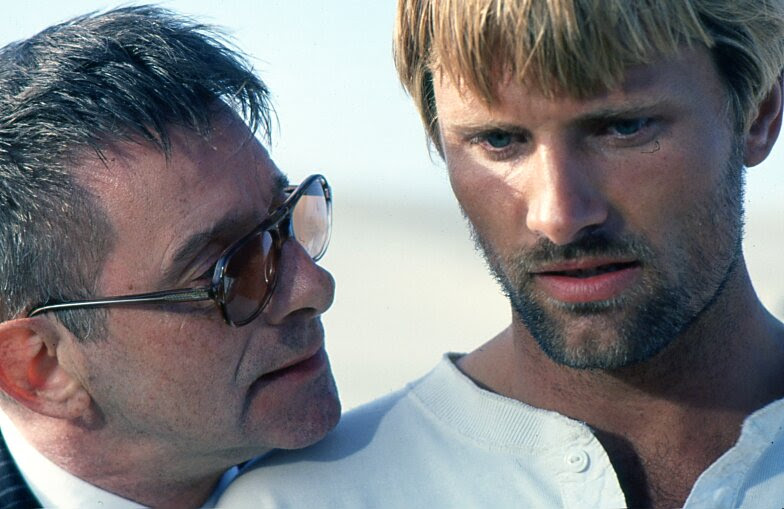***ATTENTION: FESTIVAL TICKET PRESALE BEGINS ON OCTOBER 1!***
EWANGELIA WEDŁUG HARRY’EGO / GOSPEL ACCORDING TO HARRY, dir. Lech Majewski, Polska, USA, 1993, 82 min.
The Californian desert. In the sandy wilderness there stands a bed, a TV, a table, chairs and kitchen appliances. This is where Karen (Jennifer Rubin) and Wes (Viggo Mortensen) live. The young married couple are going through a major crisis. To support the young woman, her mother comes out to the desert, then Wes’s father appears, a tax collector, the president’s bodyguard, Liz Taylor. Things get weirder and weirder. A bitter satire on America and modern civilization, in which the surreal mingles with the literal, banality with mystery, and pathos with the grotesque. The austerity of the desert, with furniture absurdly marking the boundaries of an invisible home, turns the protagonists into archetypes. Wes and Karen are a couple sagging under the weight of their burden, just like the sand around them. They reflect the darkest emotions suffered by people in America: despair, helplessness, anger. Lech Majewski - filmmaker, painter and writer, one of the most original Polish artists - amazes viewers with the metaphor-filled and elaborate visuals of the film as well as his absurd humour.
 "Gospel According to Harry" dir. Lech Majewski
"Gospel According to Harry" dir. Lech Majewski
PĘTLA / THE NOOSE, dir. Wojciech Jerzy Has, Polska, 1957, 96 min.
First name: drunkard, surname: drunkard, occupation: drunkard. This is how Kuba (Gustaw Holoubek), a life-weary alcoholic, describes himself. He lives alone in a flat that looks like a theatre prop room. His girlfriend (Aleksandra Śląska) finally manages to persuade him to get a drying-out treatment. Waiting for his afternoon doctor’s appointment, Kuba answers countless phone calls from nosey acquaintances. Irritated, he goes out and, wandering aimlessly, gets into arguments, meets his former love, and ends up at a police station after a fight. After being released he goes to a bar where he meets his former drinking mate (Tadeusz Fijewski). He starts drinking and gets into another brawl, after which he can barely find his way home. A poignant study of the suffering of an alcoholic who struggles with conflicting feelings, from numbness to madness. Black and white tones, semi-darkness and tight shots enhance the burden weighing down the protagonist, whose life is filled with hopelessness, fear and lost faith in love. The feature debut of one of the most important Polish film directors and the first adaptation of Marek Hłasko’s prose.
POŻEGNANIE JESIENI / FAREWELL TO AUTUMN, dir. Mariusz Treliński, Polska 1990, 98 min.
Atanazy Bazakbal (Jan Frycz), a young intellectual, surrenders to erotic pleasures in the arms of the demonic Hela Bertz (Maria Pakulnis). Hela is also flirting with Prince Prepudrech (Leszek Abrahamowicz). Meanwhile, Atanazy announces his engagement to an innocent gentlewoman, Zofia Osłabędzka (Grażyna Trela). But this decadent world is about to face extermination when armed communist forces approach the Bertzes’ palace. The world from before suddenly ceases to exist. Those who survive will have to come eye to eye with the red revolution that destroys everything in its path. The end of religion, philosophy and art is near; this is the end of individualism. A bold adaptation of Stanisław Ignacy Witkiewicz’s novel of the same title. A grotesque film filled with surreal humour and genuine tragedy. Winner of awards including the Andrzej Munk Prize for best debut of the year in the directing and cinematography categories. Often described as the first-ever post-communist and postmodernist film.
***
36th Warsaw International Film Festival, organised by the Warsaw Film Foundation, is supported by The Capital City of Warsaw, Polish Film Institute, Ministry of Culture and National Heritage, and Marshal's Office of the Mazowieckie Voivodeship. The WFF Sponsors and Partners are: Epson, Fabryka Wyobraźni, Going. The Official Carrier are LOT Polish Airlines. The Festival Cinemas are Kinoteka and Multikino Złote Tarasy. Our Film Industry Partner in China is Film Factory. The official cars are provided by MB Motors. The Festival Hotel is Marriott Warsaw. The Media Partners are: AMC, Co Jest Grane 24, Filmweb, K MAG, Onet, SundanceTV, and Radio Zet. Our shipper is DHL.
Contact for media representatives: Magda Maksimiuk This email address is being protected from spambots. You need JavaScript enabled to view it.
Follow us on social media:

 @warsawfilmfestival
@warsawfilmfestival
 @warsawiff
@warsawiff

















